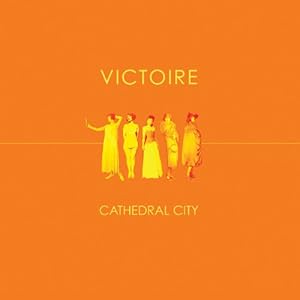 When people say that the classical music genre in itself is dead, my first reaction would be to point to thriving classical composers such as Nico Muhly and Missy Mazzoli, who are doing what the great Western tradition of classical composers has always done: making complex pieces of art that comment on life and society in the form of musical language. Then again, what makes such composers relevant is their dialogue with popular music that is more apparent then ever in the debut album from Victoire. After all, its hard to say if in the future they will be seen as a "quintet" or as just a straight up indie band. Led by composer and keyboardist Missy Mazzoli, the group mixes pseudo-classical minimalist instrumental music and experimental indie-pop. Victoire includes an all-star performing lineup that include a clarinetist, two keyboardists, a violinist, and a bassist with Missy Mazzoli leading the charge. Each of the songs on their debut full-length album are contemplative and mysterious pieces of music that reflect on modern life's moments in sometimes sweet and sometimes tense ways.
When people say that the classical music genre in itself is dead, my first reaction would be to point to thriving classical composers such as Nico Muhly and Missy Mazzoli, who are doing what the great Western tradition of classical composers has always done: making complex pieces of art that comment on life and society in the form of musical language. Then again, what makes such composers relevant is their dialogue with popular music that is more apparent then ever in the debut album from Victoire. After all, its hard to say if in the future they will be seen as a "quintet" or as just a straight up indie band. Led by composer and keyboardist Missy Mazzoli, the group mixes pseudo-classical minimalist instrumental music and experimental indie-pop. Victoire includes an all-star performing lineup that include a clarinetist, two keyboardists, a violinist, and a bassist with Missy Mazzoli leading the charge. Each of the songs on their debut full-length album are contemplative and mysterious pieces of music that reflect on modern life's moments in sometimes sweet and sometimes tense ways. Mazzoli certainly speaks the language of pop music, but with it she says things that aren't quite typical of the pop world. In the song "I Am Coming For My Things", Victoire uses samples of speech to add another ingredient of intrigue to their complex musical creations. Is the piece about materialism and desire? Is it about homelessness and emotional apathy? While Mazzoli is often ambiguous thematically in her pieces, the music certainly encourages the listener to soak it in rather than to dissect it. Victoire seems to like to focus on and repeat small moments of harmonic and rhythmic musical shifts, producing the effect of a composer exploring discrete moments of time and emotion. In one of my favorite pieces off the album, "Like a Miracle", Victoire plays buzzing electronics and eery violin lines behind a modified voice as if it is diving into the exploration of a single spoken syllable frozen in time. Its astounding that productions of postmodernity such as Cathedral City can produce such dark, unsettling, and daring music using such simple harmonic language. Its a true testament to the careful and meticulous hands of Missy Mizzoli, the delicate performance of Victoire, and their willingness to be equally comfortable playing in both clubs and concert stages. For me, Cathedral City not only was the best instrumental album and debut album of 2010, but it is also in an incredibly hopeful direction for the future of classical music that is as intrinsically relevant as it is profound.

No comments:
Post a Comment